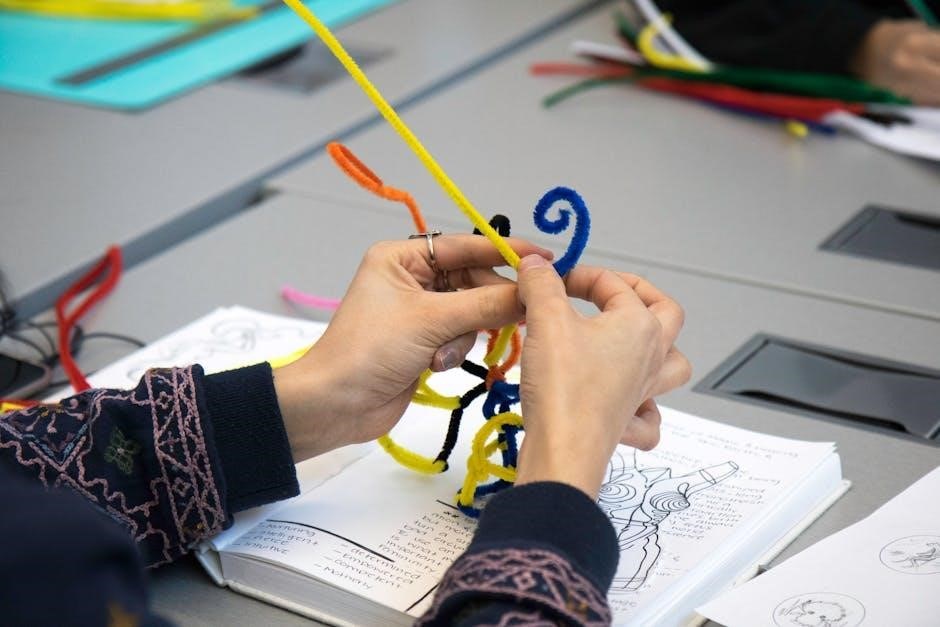Instructional Skills Workshop (ISW): A Comprehensive Guide
The Instructional Skills Workshop (ISW) is an internationally recognized program designed to enhance the teaching effectiveness of both new and experienced educators. It focuses on active‚ experiential learning and peer feedback. Participants practice and refine instructional techniques in a supportive environment‚ promoting self-discovery and collegiality.
What is an Instructional Skills Workshop (ISW)?
An Instructional Skills Workshop (ISW) is a multifaceted professional development program designed to enhance the teaching effectiveness of educators. It is an intensive‚ experiential learning approach that benefits both new and experienced instructors. The ISW is offered in small group settings‚ typically accommodating 4-6 participants to ensure personalized attention and impactful interactions.
The core of the ISW lies in its structured approach to peer feedback on microteaching. Participants design and deliver mini-lessons‚ receiving constructive feedback from their peers and facilitators. This feedback is crucial for reflecting on teaching practices and identifying areas for improvement. The ISW incorporates thematic sessions to explore various instructional techniques and learner-centered approaches.
The workshop promotes a culture of inclusion‚ curiosity‚ and learning‚ creating a positive and respectful environment for all participants. Key elements include micro-teaching‚ video analysis‚ written reflections‚ and direct feedback. The ISW encourages participants to purposefully choose strategies and tools for effective learning‚ fostering confidence and competence in their teaching abilities. It is a transformative experience that builds connections among peers and enhances overall teaching quality.
History and Origins of ISW
The genesis of Instructional Skills Workshops (ISWs) can be traced back to 1978/79 in British Columbia‚ Canada. The program originated from a pressing need to enhance teaching skills within post-secondary institutions. Initially conceived as a brief program focused on fundamental skills‚ ISWs quickly evolved into a more comprehensive and intensive model‚ adapting to the changing needs of educators.

The early success of the ISW model led to its widespread adoption and adaptation across various educational contexts. Educators recognized the value of a structured approach to peer feedback and experiential learning. The program’s focus on practical application and reflection resonated with instructors seeking to improve their teaching effectiveness. As a result‚ ISWs began to proliferate beyond British Columbia.
Since its inception‚ hundreds of educators have been trained as ISW Facilitators‚ offering workshops in diverse settings such as colleges‚ institutes‚ universities‚ polytechnics‚ hospitals‚ government departments‚ non-profits‚ and training organizations around the world. The ISW’s emphasis on direct experience‚ micro-teaching‚ and constructive feedback has made it a foundational course for individuals involved in adult education programs globally. Its enduring impact underscores its effectiveness in fostering skilled and confident educators.
Benefits of Participating in an ISW
Participating in an Instructional Skills Workshop (ISW) offers numerous benefits for both new and experienced educators. The program’s design fosters a culture of inclusion‚ curiosity‚ and continuous learning. Participants gain the ability to create positive‚ respectful‚ and supportive learning environments for all students‚ enhancing overall classroom dynamics and engagement.
One of the key advantages of the ISW is the opportunity to refine lesson design and facilitation skills. Educators learn to purposefully choose strategies and tools for effective learning‚ leading to more impactful teaching sessions. The workshop emphasizes the application of adult learning principles‚ enabling instructors to better connect with and motivate their students. Direct benefits include recognizing and applying the core tenets of effective adult teaching and learning.
Moreover‚ ISWs promote personal and professional growth through self-reflection and peer feedback. Participants experience a sense of collegiality‚ team building‚ and self-discovery‚ uncovering new approaches to working with others. The collaborative environment encourages the sharing of ideas and best practices‚ ultimately boosting teaching confidence and competence. ISW experience helps educators feel more relaxed and comfortable facilitating student-centered learning.
Key Components of an ISW
An Instructional Skills Workshop (ISW) is a multifaceted professional development program built upon several key components. At its core‚ the ISW utilizes a direct-experience approach‚ incorporating micro-teaching sessions where participants design and deliver mini-lessons. These sessions are video-recorded‚ providing a valuable tool for self-reflection and analysis;
A crucial element of the ISW is the emphasis on peer feedback. Participants offer and receive constructive feedback on each other’s mini-lessons‚ fostering a supportive atmosphere for growth and improvement. This peer-led interaction allows instructors to view their teaching from the learners’ perspectives‚ promoting a deeper understanding of their impact. The feedback focuses on the learning process rather than specific content‚ ensuring a holistic evaluation of teaching effectiveness.
The ISW also includes thematic sessions that cover institutionally relevant topics‚ such as designing lessons with achievable learning objectives. The workshop’s activities are grounded in the experiential learning cycle‚ encouraging participants to actively experiment with new teaching strategies. Furthermore‚ the program promotes reflection on one’s own teaching practice‚ encouraging personal development and continuous improvement. The collaborative environment fosters a sense of collegiality‚ team building‚ and the discovery of new approaches to working with others.

The Mini-Lesson Approach in ISW
The mini-lesson approach is central to the Instructional Skills Workshop (ISW)‚ providing a practical and focused environment for developing teaching skills. Each participant designs and delivers three mini-lessons throughout the workshop‚ offering opportunities for experimentation and refinement. These lessons are intentionally brief‚ typically lasting around 10-15 minutes‚ allowing for concentrated feedback and reflection.
In the mini-lesson‚ the instructor introduces a specific concept or skill‚ utilizing direct instruction or more open-ended activities to engage the learners. The workshop component involves students working independently or in small groups to explore or practice the new concept. After the workshop‚ the class reconvenes to debrief about their learning experience and the challenges they encountered. This structure allows for immediate application of new knowledge and techniques.
The mini-lesson format also emphasizes the importance of clear learning objectives. Participants are encouraged to design lessons with achievable goals‚ ensuring that the content is focused and the learning outcomes are measurable. By focusing on a specific skill or concept‚ the mini-lesson allows for targeted feedback from peers and facilitators‚ promoting rapid improvement in instructional techniques. This hands-on approach enables participants to gain confidence and refine their teaching methods in a safe and supportive environment.
The Role of Peer Feedback in ISW
Peer feedback is a cornerstone of the Instructional Skills Workshop (ISW)‚ providing a valuable opportunity for participants to learn from each other’s experiences and perspectives. Throughout the workshop‚ participants deliver mini-lessons and receive constructive feedback from their peers‚ fostering a collaborative and supportive learning environment. This feedback is focused on the learning process rather than the specific content‚ encouraging participants to reflect on their teaching practices and identify areas for improvement.
The peer feedback process in ISW is structured to ensure that it is both helpful and respectful. Participants are trained to provide specific‚ actionable feedback that is based on observed behaviors and their impact on student learning. They are also encouraged to focus on the positive aspects of the lesson‚ highlighting what worked well and offering suggestions for how to build on those strengths. This approach creates a culture of trust and openness‚ allowing participants to feel comfortable sharing their ideas and receiving feedback from their peers.
The benefits of peer feedback in ISW extend beyond the immediate feedback session. Participants also gain valuable insights into their own teaching by observing and providing feedback to others. They learn to view instruction from the learners’ perspectives‚ which helps them to better understand the needs and challenges of their students. This process encourages personal development through reflection on one’s own teaching practice‚ leading to increased confidence and competence in the classroom.
Experiential Learning in ISW
Experiential learning forms the core of the Instructional Skills Workshop (ISW)‚ emphasizing hands-on activities and direct application of concepts. This approach moves beyond traditional lecture-based learning‚ immersing participants in a dynamic environment where they actively engage with the material and learn by doing. The ISW is designed as a direct-experience workshop‚ incorporating micro-teaching sessions‚ video recordings‚ and immediate feedback to facilitate practical skill development.
The experiential learning cycle in ISW involves participants planning‚ delivering‚ and reflecting on mini-lessons; This process allows them to experiment with different instructional techniques and observe the impact of their choices on student learning. The use of videotaped sessions provides an opportunity for self-reflection and analysis‚ enabling participants to identify their strengths and areas for improvement. Furthermore‚ the peer feedback component enhances the experiential learning process by providing diverse perspectives and insights.
Through experiential learning‚ ISW participants gain a deeper understanding of effective teaching strategies and develop the confidence to implement them in their own classrooms. This approach fosters a sense of ownership and investment in the learning process‚ leading to more meaningful and lasting changes in teaching practices. The ISW’s focus on experiential learning ensures that participants not only acquire new knowledge but also develop the skills and abilities necessary to become effective and engaging educators.
ISW as Professional Development for Educators
The Instructional Skills Workshop (ISW) serves as a valuable professional development opportunity for educators at all stages of their careers. Whether new to teaching or seasoned professionals‚ participants can benefit from the intensive‚ collaborative‚ and experiential learning environment offered by the ISW. It addresses a critical need‚ particularly in higher education‚ where instructors are often hired for subject matter expertise without formal training in pedagogy. The ISW equips educators with practical skills and strategies to enhance their teaching effectiveness.
By focusing on learner-centered approaches and providing opportunities for peer feedback‚ the ISW encourages educators to reflect on their teaching practices and develop a deeper understanding of how students learn. The workshop’s emphasis on creating inclusive and supportive learning environments aligns with the growing need for educators to address the diverse needs of their students. The ISW provides a structured framework for educators to design engaging lessons‚ choose effective instructional tools‚ and foster a culture of curiosity and learning in their classrooms.
Furthermore‚ the ISW fosters a sense of collegiality and team building among participants‚ creating a network of support and shared learning experiences. The skills developed through the ISW‚ such as effective communication‚ constructive feedback‚ and reflective practice‚ are transferable to various professional contexts‚ making it a valuable investment in educators’ overall career development. Completion of the ISW demonstrates a commitment to continuous improvement and a dedication to providing high-quality learning experiences for students.
ISW and Adult Learning Principles

The Instructional Skills Workshop (ISW) is deeply rooted in the principles of adult learning‚ recognizing that adult learners bring unique experiences‚ motivations‚ and learning styles to the educational setting. The ISW embraces experiential learning‚ allowing participants to actively engage with the material through micro-teaching sessions and peer feedback‚ rather than passively receiving information. This hands-on approach aligns with the adult learning principle of learning by doing‚ fostering deeper understanding and retention.
The workshop acknowledges the importance of relevance and practicality for adult learners‚ focusing on skills and strategies that can be immediately applied in their teaching contexts. Participants are encouraged to connect the workshop content to their own experiences and challenges‚ making the learning more meaningful and impactful. The collaborative nature of the ISW also supports adult learning principles‚ as participants learn from each other’s perspectives and experiences in a supportive and respectful environment.
Furthermore‚ the ISW promotes self-reflection and self-direction‚ empowering participants to take ownership of their learning and development. The workshop provides opportunities for participants to assess their own teaching practices‚ identify areas for improvement‚ and develop personalized action plans. By incorporating these adult learning principles‚ the ISW ensures that participants are actively involved in their learning process‚ leading to greater engagement‚ motivation‚ and ultimately‚ more effective teaching practices. The focus on constructive feedback further facilitates growth and development.
Skills Developed in an ISW
Participating in an Instructional Skills Workshop (ISW) cultivates a range of essential skills for educators and trainers. Participants enhance their ability to design and facilitate engaging lessons that promote active learning. They learn to create a positive and inclusive learning environment‚ fostering curiosity and respect among learners;
The ISW strengthens skills in providing and receiving constructive feedback‚ enabling participants to effectively support the development of their peers and students. Participants develop a deeper understanding of instructional techniques‚ learning to purposefully choose strategies and tools for effective learning. The workshop also promotes skills in lesson planning‚ helping participants to design lessons with clear and achievable learning objectives.
Furthermore‚ the ISW improves communication and presentation skills‚ as participants practice delivering mini-lessons and presenting their ideas to others. Participants also enhance their ability to reflect on their own teaching practices and identify areas for improvement‚ fostering a growth mindset. By participating in the ISW‚ individuals gain confidence in their teaching abilities and develop a valuable toolkit of skills that can be applied in a variety of educational settings. The emphasis on experiential learning solidifies these skills.
Collaboration and team-building skills are also developed through peer interaction.
Who Should Attend an ISW?
The Instructional Skills Workshop (ISW) is designed for a broad audience of individuals involved in supporting learning and development. This includes both new and experienced educators seeking to enhance their teaching effectiveness. University professors‚ secondary school teachers‚ trainers‚ instructors‚ coaches‚ managers‚ and team leaders can all greatly benefit from participating in an ISW.
The ISW is particularly valuable for professors who may possess strong subject matter expertise but lack formal training in teaching methodologies. It provides them with the necessary skills to effectively convey their knowledge and engage students in the learning process. Similarly‚ individuals involved in adult education programs‚ such as corporate trainers and community educators‚ will find the ISW to be a foundational course.
Anyone who facilitates learning‚ whether in a classroom‚ workshop‚ or one-on-one setting‚ can benefit from the ISW’s emphasis on experiential learning‚ peer feedback‚ and reflective practice. The workshop is also suitable for those who are interested in developing their leadership and communication skills‚ as it provides opportunities to practice presenting and facilitating discussions. Regardless of their background or experience level‚ participants will gain valuable insights and practical skills.
The ISW welcomes individuals from diverse disciplines and backgrounds who share a common goal of improving their instructional abilities.
ISW and its Impact on Teaching Effectiveness

Assessment and Completion of an ISW
The Instructional Skills Workshop (ISW) employs a competency-based assessment approach‚ focusing on the participant’s ability to apply the learned principles and techniques. Completion of the workshop is typically assessed on a Pass or Fail basis‚ ensuring participants demonstrate a satisfactory level of understanding and skill in instructional design and delivery.
To successfully complete the ISW‚ participants are expected to actively engage in all workshop activities‚ including planning and delivering three mini-lessons. A crucial aspect of the assessment involves providing valuable and constructive feedback to their peers on their lessons‚ demonstrating an understanding of effective feedback techniques. Furthermore‚ participants must demonstrate a willingness to reflect on their own teaching practices and incorporate feedback to improve their lessons.
The assessment process emphasizes the learning process and the participant’s ability to create a positive learning environment rather than focusing solely on content mastery. Facilitators evaluate the participant’s ability to design lessons with achievable learning objectives‚ facilitate engagement‚ and adapt their teaching strategies based on learner needs.
Upon successful completion of the ISW‚ participants typically receive a certificate or other form of recognition‚ acknowledging their achievement and demonstrating their commitment to professional development in teaching. The ISW certificate is often recognized as a foundational qualification for educators in various settings.
